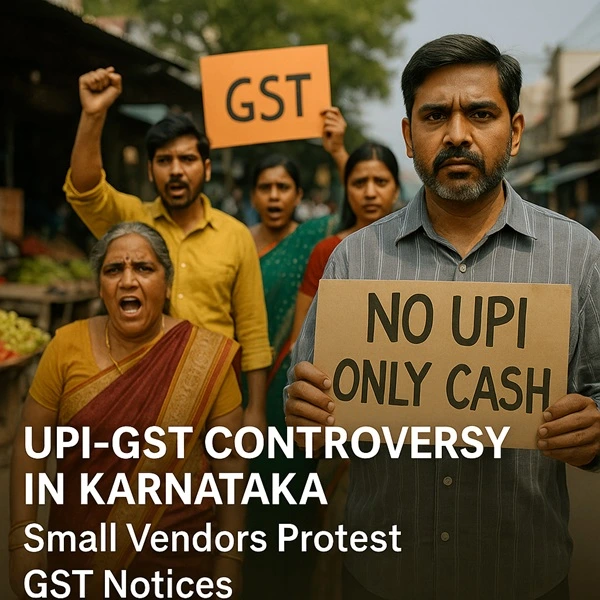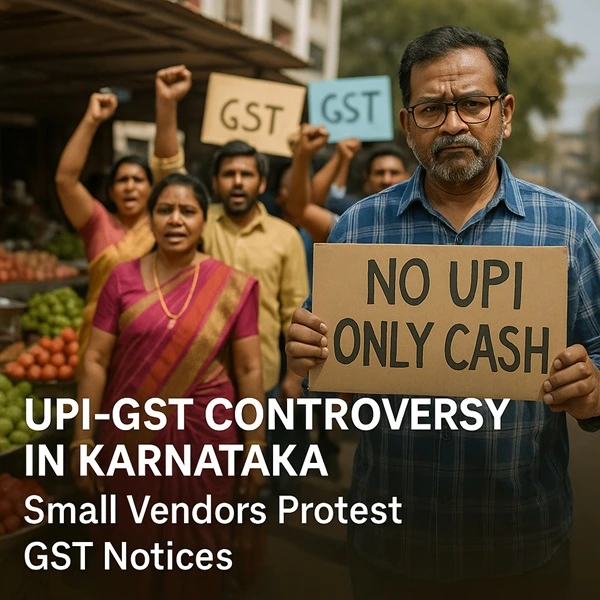When the QR Code Became the Villain
Imagine walking into your favorite street side fruit stall in Bengaluru ripe bananas piled high, the vendor smiling as he waves his QR code placard at you. You lift your phone to scan, but the QR is gone. In its place? A handwritten sign that reads:
“NO UPI, ONLY CASH.”
This isn’t a glitch in the system. It’s not a temporary network failure. It’s a silent protest echoing across thousands of shops, carts, and kiosks in Karnataka an outcry triggered not by politics or policy announcements, but by the humble UPI transaction itself.

In a shocking turn of events, small traders and street vendors are facing hefty GST notices, some running into tens of lakhs, based purely on their UPI income history, much of which includes exempt goods, personal transfers, and even unrelated payments.
The backlash? Fierce. Organized protests. Angry vendors. Customers caught off guard. A quiet rebellion against a government system that was supposed to uplift them, but now threatens to drown them in compliance.
But what exactly sparked this chaos?
Is this just a case of poor communication or a deeper, structural crack in India’s digital economy narrative?
And what happens when a city like Bengaluru where 95% of daily transactions run on UPI, suddenly hits pause on digital payments?
This isn’t just about taxation.
It’s about trust, technology, and the tightrope between transparency and livelihood.
Let’s unpack the full story, because behind every QR code lies a fight for survival.
Karnataka UPI and GST Controversy: What Actually Happened?
In recent weeks, Karnataka’s Commercial Taxes Department issued GST notices to thousands of small vendors, primarily based on their UPI transaction data. Traders who had received over ₹40 lakh per annum through UPI gateways triggered scrutiny, even if they dealt in exempt goods like fruits and vegetables.
One vendor in Haveri was slapped with a ₹29 lakh demand for ₹40 lakh turnover, igniting uproar across the state.
Authorities, using UPI trails, flagged roughly 14,000 unregistered vendors as potential defaulters, even issuing notices up to ₹40 lakh based on data stretching back to FY 2021–22
Karnataka UPI and GST Controversy: Why Are Small Vendors Protesting?
- Economic Shock: With profit margins typically under 10%, notices demanding up to 50% of turnover (including penalties) are crippling. Vendors requested relaxation, fearing closure of their businesses.
- Awareness Gap: Many traders were unaware that UPI inflows count as taxable turnover. Some included personal transfers, agricultural earnings, or agency payouts all misconstrued under GST thresholds.
- Digital Distrust: Vendors responded with protests and a call for boycott of UPI, reverting to “No UPI, only cash” signage a move undermining India’s push for digital payments.
- Policy Ambiguity: Lack of prior guidance and sudden enforcement without proper communication triggered anger and confusion.
In Bengaluru, a three day protest and planned bandh were called, putting additional pressure on the system.
What Does This Mean for a City Like Bengaluru (95% UPI Usage)?
- Digital Regression: A reversal from digital to cash damages both trader convenience and India’s digital mission, particularly in a tech hub like Bangalore.
- Consumer Friction: Customers inconvenienced, trust eroded, and everyday routines disrupted as vendors refuse QR codes.
- Administrative Burden: Sudden spike in compliance distress calls, confusion, and data reconciliation issues overwhelm small traders.
Official Response & Resolution
Chief Minister Siddaramaiah stepped in, announcing that old tax arrears on exempt goods will not be pursued provided traders now register under GST and maintain compliance going forward.
The state also launched a ‘Know GST’ awareness campaign, easing panic by clarifying flip flops between modes of payment don’t exempt from tax duties. Dedicated helplines were set up, and grievance addresses prioritized.
As a result, protests were called off, and vendors agreed to a reset in implementation with conditions.
So, Is This Good or Bad for the Economy & Income‑Tracking?
| Aspect | Positive | Negative |
|---|---|---|
| Revenue Tracking | Helps broaden tax base and identify non compliant traders via digital trails. | Risks penalizing small vendors with retroactive demands on mixed income. |
| Digital Push | Reinforces the importance of formal registration, even for digital earnings. | Traders avoid UPI, reverting to cash, weakening digitisation efforts and traceability. |
| Policy Trust | Government issued corrective relief and built helpful support systems. | Initial abrupt enforcement eroded trust, and may discourage honest digital users. |
| Inclusivity | Aims to bring more traders into the formal economy. | May exclude or penalise those genuinely operating below thresholds or in exempt categories. |
Karnataka UPI and GST Controversy Conclusion: Lessons & the Path Forward
This controversy underscores a delicate policy tightrope: enforcing compliance through data-driven methods while protecting vulnerable informal sectors. UPI trail usage offers powerful tax tracking potential but must be balanced with education, context checking, and fair grievance mechanisms.
For Bengaluru’s vendors, the message is clear: digital convenience must be matched with clarity and support. And for policymakers, smart enforcement demands both data analysis and human empathy.
Frequently Asked Questions on the Karnataka UPI and GST Controversy
1. Why are small vendors in Karnataka suddenly receiving GST notices for UPI transactions?
The Commercial Taxes Department used UPI data (FY 2022–25) to flag approximately 14,000 traders who crossed GST registration limits ₹40 lakh per year for goods and ₹20 lakh for services and issued notices demanding tax arrears, some reaching ₹29 lakh. Notably, even traders dealing in GST exempt goods (like fruits) were targeted due to digital inflows being misclassified as taxable turnover.
2. Can switching from UPI to cash help vendors avoid GST obligations?
No. The Karnataka GST Department clarified that GST applies regardless of payment mode. Whether received via UPI or cash, once turnover exceeds thresholds, registration and compliance are mandatory.
3. What’s behind the “No UPI, Only Cash” signs at small stalls?
Facing retrospective GST notices, many vendors especially in Bengaluru have removed QR codes and reverted to cash only systems. They argue UPI inflows included personal or non business transactions, causing unintended GST triggers.
4. What have vendors done in protest?
Traders formed the Karnataka Karmika Parishat (KKP), called a strike on July 23–24, and threatened a complete shutdown on July 25, affecting essential goods like tea, milk, and groceries across the state.
5. How has the government responded?
State leadership launched a “Know GST” awareness campaign, setting up workshops and a helpline to guide vendors through compliance steps. CM Siddaramaiah assured that notices were not immediate tax demands but requests for transaction details and pledged to address concerns at the upcoming GST Council meeting .
6. Will GST be waived for vendors dealing in exempt items?
Yes. After sustained protests, the government withdrew GST notices on exempt goods (e.g., fruits, vegetables, milk) and waived old arrears, provided vendors now register under GST and comply going forward .
7. Is this crackdown beneficial or harmful to the economy?
✔ Benefits
- Encourages formalization and expands the tax net.
- Leverages UPI data to improve compliance tracking.
✖ Drawbacks
- Risks reversing digital adoption: vendors are ditching UPI due to fear of notices.
- Causes compliance confusion, especially among low margin traders with limited accounting awareness.
- Breeds distrust due to abrupt enforcement without adequate guidance.
8. Do vendors have avenues to appeal or clarify misunderstandings?
Yes. Tax officials clarified that notices are not definitive demands. Traders can submit documentation and explanations, especially to exclude exempt goods from taxable turnover and challenge demands accordingly.
9. Could this controversy undermine India’s digital payment push?
Absolutely. Experts warn that this incident may drive honest vendors away from UPI, undermining India’s shift to a cashless economy. Many state stakeholders urge revisiting GST thresholds and strengthening education on compliance.
10. What’s the bigger lesson from this episode?
Policy enforcement driven by digital trails is powerful but must be matched with contextual awareness, tailored education, and fair grievance mechanisms. Without this balance, well intentioned measures may backfire, stalling the digital revolution they aim to support.

Hi, I’m Prashant Jain — a curious soul, storyteller, and content creator at heart.I’ve always been drawn to the world of entertainment, travel, sports, health & lifestyle — not just as a writer, but as someone who genuinely lives these experiences. Whether I’m binge-watching the latest OTT series, exploring offbeat spiritual destinations in India, or diving deep into wellness routines and cricket match insights, I love sharing what I discover with like-minded readers.
PopNewsBlend is my way of blending personal journeys with meaningful stories — ones that inform, inspire, and keep you ahead of the curve. Everything I write comes from real observations, hands-on experiences, and a deep passion for understanding the world around us.
Discover more from Popnewsblend
Subscribe to get the latest posts sent to your email.







